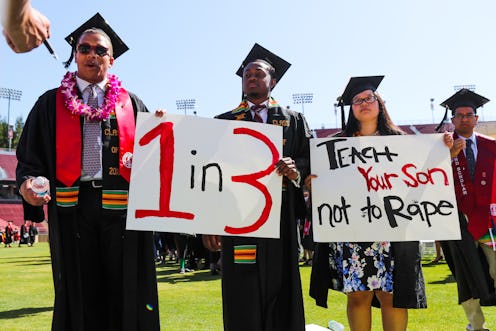After being convicted on three felony counts by a unanimous jury for sexually assaulting an unconscious woman in January 2015, Stanford swimmer Brock Turner was sentenced to only six months in county jail. This sentencing by Judge Aaron Persky justifiably generated a great deal of outrage — but it gets worse. According to the Santa Clara County's Department of Corrections website, Turner is expected to be released on Friday, after having served only half of his original sentence. Turner's early release is indicative of white male privilege, and while Persky's leniency toward Turner is therefore unsurprising, it should still make us angry.
According to The Guardian, Turner could have received a sentence of up to 14 years for the three felony charges on which he was convicted, but prosecutors asked Persky — who is an alumnus of Stanford — to sentence Turner to six years in a state prison. The judge declined to do so, and justified the eventual six-month sentence with positive character references. "A prison sentence would have a severe impact on him," Persky said at the time. "I think he will not be a danger to others."
If Turner had been a person of color, people like Persky would have looked for numerous ways to incriminate him. They would have released his mugshot immediately, instead of withholding it for months as they did. They would have criminalized his past as extensively as possible, instead of asserting that he would "not be a danger to others." He certainly would not have gotten away with such a light sentence, given that mass incarceration disproportionately impacts people of color, including for nonviolent offenses. That's not to say that rapists of color should also receive lighter sentences, because that is not the case; instead, the point here is that Turner's white male privilege had a lot do with the judge's leniency.
In fact, the cases of Turner and Cory Batey — a Vanderbilt football player — highlight the role Turner's privilege played in his sentencing. In April, Batey was also convicted on three felony counts for sexually assaulting an unconscious woman. He received a minimum sentence of between 15 to 25 years. As Shaun King wrote for the New York Daily News, "What Batey did was reprehensible. The judge and jury treated his crime as such."
But what was the difference between these two college athletes, other than that Batey received a much higher sentence than Turner did for a similar crime? Batey is a black man. Again, the point here is not to insist that Batey should have received a lighter sentence like Turner, but rather that there is a disparity between how white people and people of color are treated by the justice system.
Turner's early release also speaks to the ways in which college campuses handle rape and sexual assault cases. A 2015 study by the Journal of Adolescent Health indicated that roughly 20 percent of women are victims of sexual assault in college — but according to the Department of Justice's National Crime Victimization Survey from 2014, approximately 80 percent of college students did not report an assault that had taken place.
Turner is a white man who was caught in the act of assaulting a woman, and he faced minimal consequences. This is proof of his privilege, as well as of the prevalent nature of rape culture on college campuses. His early release on Friday may not surprise us, but it should certainly make us angry and convince us to demand justice.
